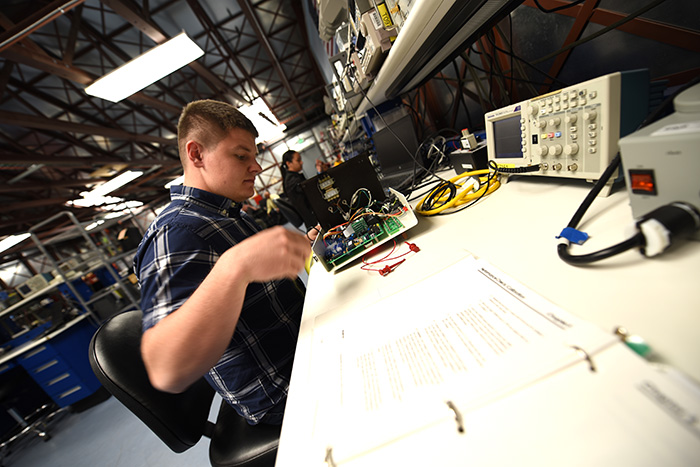Maintenance Key to Medical Device Precision, Accuracy

A baby in an incubator. That was the image that Army engineering technician Tyler Dowell recalled as he described the importance of the mission at the U.S. Army Medical Materiel Agency's Medical Maintenance Operations Division-Tracy.
A former instructor had showed Dowell and the other students a photo of a newborn in an incubator, born not only prematurely but also into a war-torn country. The incubator saved the newborn's life; an incubator that the instructor, an Army medical maintenance specialist, had recently calibrated to ensure its temperature, humidity and alarming systems worked exactly as designed.
"It's not about the item we touch; it's about the patient that uses it," said Curtis Randolph, chief of MMOD-Tracy.
MMOD-Tracy, located on Defense Distribution Depot San Joaquin, California, is one of three stateside medical maintenance depots that operate under the U.S. Army Medical Materiel Agency, a subordinate organization of the U.S. Army Medical Research and Materiel Command. In addition to providing maintenance for medical imaging equipment, MMOD-Tracy serves as the Center of Excellence for special purpose test, measurement and diagnostics equipment .
Special purpose TMDE is an essential part of Army readiness because it provides the capability to test, repair, adjust, synchronize and verify accuracy of life-saving medical equipment worldwide. Each TMDE item requires a separate calibration procedure and traceability requirement, guided by national and international standards. In fiscal year 2017, MMOD-Tracy serviced more than 2,000 pieces of special purpose TMDE, operating in partnership with the U.S. Army Test, Measurement, and Diagnostic Equipment Activity, which has the primary organizational responsibility of performing the TMDE calibration and repair support mission for the Army.
"The test equipment that we do here is actually specific to medical devices, whereas test equipment calibrated by USATA would be for calibrating things used on helicopters, tanks, weapons, etc. â€" different parts of the Army," explained Dowell, who is also an Army Reservist.
Over the past year, MMOD-Tracy has been modernizing its TMDE lab to make their processes more efficient. Randolph said they have managed to speed up their through-put, which was more than 30 days and is now an average of seven days. Turning the equipment around faster not only saves the Army time and money, but it also means that the Soldier in the field who needs the piece of equipment gets it faster.
"The staff's competency continues to increase because they know what we are doing and why we are doing it," said Randolph, a retired Soldier who has served the Army for 35 years. "It's not about politics in here. It's about where we are. We are all one team, one fight."
 An official website of the United States government
An official website of the United States government
 ) or https:// means you've safely connected to the .mil website. Share sensitive information only on official, secure websites.
) or https:// means you've safely connected to the .mil website. Share sensitive information only on official, secure websites.


